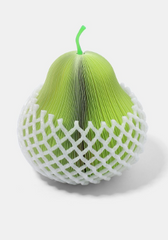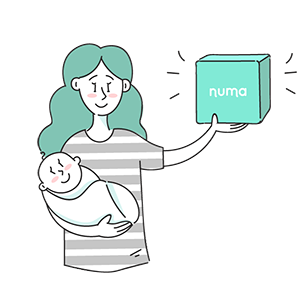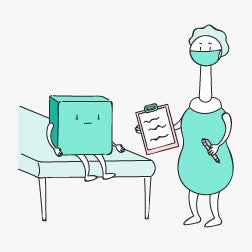numa's Guide to Childbirth Recovery

Surprises are great, right?
Ha, not when it comes to childbirth.
If this sounds obvious, why is it that most of us are better prepared for a weekend trip than the average mom is for her recovery?

Sounds absurd. Yet . . . it’s kinda true.
How is this possible?
Well, there’s a lot going on here.
3 Reasons Childbirth Recovery is Overlooked
Reason #1: Awwwwww
Babies are cute.

So damn cute.
No one to blame here. Turns out it’s simply fun to prepare for babies. Especially compared to what new moms experience - pain, exhaustion, bleeding, swelling… (you get it).
And parenting is life-changing. Loving and caring for the baby is obviously important.
BUT… mom’s recovery should be a priority.
Crazy concept, huh? Sounds non-controversial but our society is failing at this.
Ok, maybe you’re thinking: “New moms just know how to suck it up for a few weeks while their new baby needs them the most."

Moms do this all the time and will continue to do it because they're f****ing heroes. We laugh it off with a meme and say "that's just the way it is."
Hilarious! But it doesn't have to be this way.
First and foremost, making mom’s recovery a priority is a must.
Plus, how can a new mom possibly provide the best care for her child when she is pushed to the brink of exhaustion? A mom who prioritizes her own well-being is better able to take care of her adorable new baby.
Reason #2 Childbirth is Overlooked: Ewwwww
Let’s be honest - vaginal bleeding, hormonal changes, and mental health aren’t what most people would consider “sexy” or “fun” topics.
Especially when compared to cute babies (awwww). And especially in the U.S. where these topics are seen as taboo.
So what do we do?
Avoid.

Like a toddler delaying bedtime, we do everything we can to avoid it.
The problem is, these "not fun" topics are typical factors in every mom’s recovery. Not preparing for these symptoms ahead of time makes them 1000x more challenging when postpartum arrives.
We as a society have a looooong way to go but we’re s l o w l y getting better about talking about this “taboo” subject.
Case in point - here are a couple examples of moms confronting the realities of the postpartum experience in media:

Simple. Funny. And spot on.
It summarizes one of the many unexpected aspects of the postpartum experience: There will be blood.

Sort of like your period but worse and lasts longer...
Chrissy has been awesome at being candid about postpartum realities, from both a physical and mental health perspective.
Prefer R-rated humor?
Try Ali wong’s netflix standup: Hard Knock Wife.

It’s edgy, hilarious, and only slightly exaggerated.
Here’s one of her gems:
“Nobody told me about all the crazy shit that comes out of your pussy after you give birth.
You have to wear this cartoonishly large pad, that’s like the size of a toddler mattress. And it’s only held up by the strength of this mesh-fishnet underwear that’s exclusively available at the hospital.
You can’t get that shit on Amazon or anything. So you gotta snatch that shit every day. It’s made out of the same material that they package fancy Korean pears in.”



(P.S. numa has a better option)
Reason #3 Childbirth is Overlooked: wuuuuttt? huhhhhh?!?!

There’s soooo much to prepare for:
- Set up the nursery (nesting!)
- Install car seats
- Pack your hospital bag
- Find daycare
- Learn how to be a parent
- And don’t forget to stock up on diapers, wipes, sleep sacks…
Amidst of all this chaos, you have to find time to figure out the baby’s name (and agree on it).
By the way, we’re just talking about the final 2 weeks!
When the big day comes, it’s filled with every emotion you could ever imagine - from the pain of contractions to the unrivaled joy of holding your baby for the first time.
After a couple of head-spinning days at the hospital where you have nurses at your whim, you’re ready to take your bundle of joy home.

Once you complete the harrowing drive home, questions start spinning in your head...
“When will I get to catch up on sleep?”
“Will I ever be able to poop normally again?”
“Will my vagina be ok? what is going on?”
All the while telling yourself that you shouldn’t complain because this is one of the happiest events of your life.
Welcome to postpartum!
When the focus shifts completely off your pregnancy to this amazing new life that you’ve created.
But wait. This is a critical time for your own recovery, both physically and mentally.

To sum up the #3 reason that childbirth recovery is overlooked: There’s a ton of shit going on.
Now it all sorta makes sense.
But it’s still crazy! And we can and should do better!
Because we know that physical and mental well-being are intertwined.
Support systems, preparing and being informed, managing stress and anxiety… these are all factors that impact both physical and mental health.
Improving any of these by themselves will make the postpartum experience better overall.
Improving all of these factors at once can make a world of difference.
_______
Childbirth Recovery Tips
What specifically can you do to prepare for childbirth?
And how can others support new moms while they recover?
1. Have a Recovery Plan
The postpartum period is a roller coaster of emotions.
🤗😥😍😕😳
All tied-up with a big bow of hormonal chaos.
Meaning you very well could be tickled with joy over your newborn one minute and bawling harder than your newborn the next.

We think a lot about how the day (or days!) of labor and the birth will go, but blissfully ignore the several weeks and months of recovery afterwards.
That’s like spending 99% of your engagement preparing for the wedding and 1% preparing for life after the wedding with your partner (oh wait, people do that too?).
So the better prepared you can be ahead of time, the better off you’ll be when this chaotic time hits.
Of course, things won’t go exactly as you plan. Be willing to adjust based on how your body and mind respond during the recovery.
Bonus Tip:
Get a numa kit!
Think your baby shower is all about baby gifts? Your baby will get enough gifts.
Happy mama = Happy baby.
This is your baby shower and you deserve a gift that will make postpartum life better.

And your close friends and family want this opportunity to help you.
So give them a little nudge. Let them know they can be the star of the shower by getting you a numa kit.
2. Know What to Expect

We’re not in the Dark Ages anymore, so no need to rely on medical astrology for treatment.
Access to medical information is better than ever. Yet there’s still a disconnect between our collective knowledge of the postpartum experience and the information that is passed to expecting moms.
In our effort to address this disconnect, we’re curating resources that are specific to recovery.
Here’s a tool (link to symptoms tool) that covers the symptoms that new moms are likely to encounter.
Hold up a sec though, things are never as straightforward as they seem...
More information = more opinions.
There’s conflicting information and varying opinions on the best form of treatment, recovery methods, level of activity, breastfeeding, etc.
Which means if you ask for advice, you might get this:

So check out multiple sources and weigh different options before making major decisions.
Have an open mind. Decide what is best for your situation. And be willing to change if something isn’t working.
3. Tap Into Your Inner Bee

No not that B.
This bee:

“Uhh riiight… what the hell can we learn from some crazy bees?”
They’re collaborative and they survive on their ability to communicate with each other.
Use your network. Your family and friends can give you helpful advice, whether they’ve been through it themselves or not.
Every mom’s journey is unique but you can still learn from others.
Don’t have anyone close to you who you feel comfortable getting advice from?
That’s ok! There are plenty of options to seek out support:
-
Support groups. For example, Postpartum Support International has local groups throughout the world.
-
Local Postpartum Wellness Centers. For example, Postpartum Wellness Center in Boulder, CO or Blooma in Minneapolis, MN.
- Ask a nurse or doula at the hospital or birth center where you plan to give birth.
4. Know What to Ask for
Ok so you have some people who want to help. Problem is, they don’t know exactly how to help.

“How about I hold your precious new baby while we chat and catch up?”
Ok, that might be great for about 50 minutes but it gets pretty old pretty quickly. Especially if you have a never-ending parade of enthusiastic family and friends marching to your door.
Sometimes there’s no holding back your zealous family. They’re gonna want their hands on that baby ASAP.

This is natural and they obviously mean no harm. But once they get their fix, they’ll be ready to help elsewhere.
So how can they help?
Cleaning!
Remember all the nesting you did to prep your house for a new baby? Now it looks like the cat lady hoarder’s garage and you don’t have the time or energy to clean it.
Cooking!
You hardly have time to shovel food into your mouth much less prepare anything.

They’ll appreciate the opportunity to put a smile on your face no matter how good the food is.
As a bonus, they can help hold the baby while you eat! Win/Win.
Pick up groceries
Maybe not the most fun but they’re probably going to the store anyway!
Assign a “gatekeeper”
This is a good task for your husband who wants to relive his days as a bouncer. If he’s up for it, put him in charge of coordinating with family and friends on when they can drop by.
What’s the takeaway?
People want to help but often don’t know exactly how. So don’t be afraid to ask! You’ll appreciate all the help you get and you’ll want to pay it forward.
Bonus tip - Getting a postpartum Doula can make a huge difference since they focus on the needs of the mom. An experienced Doula will know what the mom needs before she does.
5. Don’t Overdo It
You’re already a badass by giving birth to a child. Period.
So recover at a manageable pace.
You’re not going to work yourself back to pre-pregnancy shape in the first week. Just like a first-time marathoner isn’t going to go 26.2 miles on their first training run.

Take activities and exercise at a pace that works for you. Your body is recovering from an intense process and recovery won’t happen overnight.
Manage your pain. Listen to your body’s signals. Drink plenty of water.
Bonus tip - Postpartum physical therapy is a technique to assist in the recovery, which unfortunately is not used as frequently as it should. Your doctor can recommend it or you can do some research on your own to see if it’s a fit for you.
6. Rest!

Sleep when baby sleeps (you might read / hear this to the point of annoyance).
You’re thinking, “Oh duh. And clean when the baby cleans.”
You have a point. Sometimes this is doable, sometimes it’s not happening. No amount of sage wisdom will change the likelihood of a new mom’s ability to rest enough.
BUT... follow the other tips on this list and you just might be able to sleep when the baby sleeps.
Bonus tip:
Have a standard practice for dealing with stress and set aside brief moments for it. Some examples:
Advice from your Mom: “Pray!”
Your Hippy Friend: “Meditate!”
Your Nurse: “Take Slow Deep Breaths!”
Your Sister: “Scream F**k into a Pillow!”
Or whatever floats your boat.
The point is, it can be helpful to create a go-to ritual that is calming and relaxing.
7. If Something Feels Off, Speak Up
Don’t be afraid to call your nurse or doctor if something seems off either mentally or physically.
There are a ton of common symptoms that are normal to experience during recovery. But if you have any doubt, play it safe and call.
Generally speaking, it’s best to contact your care provider if you have any doubts or are experiencing serious symptoms such as:
- Vaginal bleeding that increases each day instead of decreasing
- Breasts that are red or feel hot
- Passing clots larger than a quarter
- Chest pain or difficulty breathing
- Chills and/or high fever
____
Cliff notes:
Being prepared for childbirth recovery is important.
Recovery is overlooked. Why?
- All the focus is on the baby because babies are cute
- It isn’t fun to talk about so we avoid it.
- There’s so much else to plan for so we don’t hear about it.
We as a society are capable of solving and/or preventing these.
At numa, we’re working to improve the postpartum experience with our recovery kits and resources.
Here are steps you can take:
- Order a numa kit!
- Check out our Guidebook
- Check out our other Recovery Resources
P.S. - This information might not apply to you because everyone’s recovery is different. Talk to your doctor to find out if this applies to you.
P.P.S. - Wondering how we came up with all of this? We do our research. Here our sources:
WHO Report: Postpartum Care for the Mother and Newborn: A Practical Guide
Harvard Health Publishing - Harvard Medical School
Postpartum Support International
Mayo Clinic
March of Dimes
babcycenter.com
The Fourth Trimester: A Postpartum Guide to Healing Your Body, Balancing Your Emotions, and Restoring Your Vitality
The First 40 days: The Essential Art of Nourishing the New Mother
American Congress of Obstetricians and Gynecologists
← Back to Guides
Share:





























